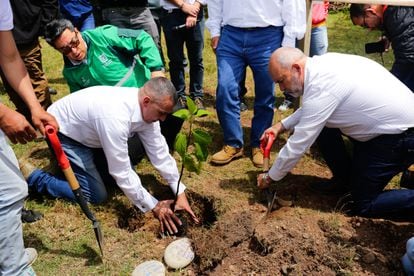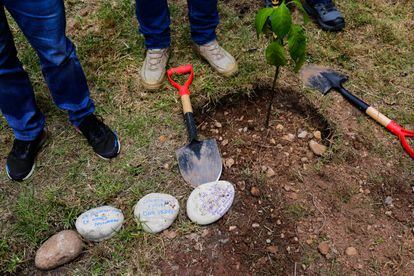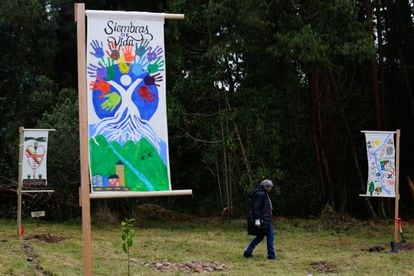It is eight in the morning and about 30 retired soldiers are sitting in front of a pine forest talking about one of those topics on which everyone has an opinion but no one has answers: reconciliation after the war. How do you forgive someone who disappeared a child? How do you make amends to someone who lost a brother? One of them, a retired general named Henry Torres Escalante, quotes a gringo psychologist to introduce the topic: “he said: if your only tool is a hammer, you tend to treat every problem as if it were a nail.” War looks at every conflict like a nail. Restorative justice, he believes, opens another toolbox for us. Torres has been asking these questions for some time. He confessed, last year, that soldiers under his command murdered 196 civilians between 2005 and 2007—the crime known as 'false positives'. “I take responsibility,” he said then. That was the beginning, just, of his journey to repair this society with something other than a hammer.
All the ex-military members next to the forest are appearing before the Special Jurisdiction for Peace, or JEP, the special court that was born in 2016 and did not want to be governed by punitive logic. Theirs is restorative justice: not sending thousands of former FARC guerrillas to prison, or former soldiers who have committed war crimes, but offering alternative sentences in exchange for truth. But, in the years it has been operating, there has not yet been a first alternative sentence. And, meanwhile, another objective had been left under the rug: restore. The JEP proposed from the beginning to also integrate the perpetrators into environmental, educational or memory projects, as part of the conditions to repair the victims and society. Work understood as part of their sanctions. This restoration process officially began this Tuesday in front of a pine forest.
“This is a very important moment for the jurisdiction,” says the president of the JEP, Roberto Vidal, together with the former military personnel, in a press conference to present the first restorative pilot project: Sows of Life.
The former soldiers are in the town of Usme, in the Andean hills of Bogotá, one of the poorest areas of the capital and where the guerrilla and the public force have been accused of committing kidnappings and disappearances. This group did not commit their crimes there, but Torres says that they are in that forest to start a “new front,” a green front. Together with the help of the Botanical Garden and the Natura environmental foundation, the former military personnel will work for a year to ecologically repair an environmental corridor on the slopes of the capital. They will start with 15 degraded hectares next to the Chisacá dam, where they will eliminate invasive species (such as thorny broom) and plant native species (such as black sage, Garrocho, myrtle).
“Nature was also a victim of the conflict, because it was cut down, because bombs fell, because it was contaminated,” Clara Solano tells El PAÍS, director of the Natura foundation, and who compares the process of restoring a forest to that of restoring a society. after the war. To restore an ecosystem, she says, you must first look at what parts of that system and the connections they had before the damage was caused—such as fires, logging, or changes in land use. That is to then design the plan for ecological restoration: to intervene carefully to recover each part of the whole.
Newsletter
The analysis of current events and the best stories from Colombia, every week in your mailbox
RECEIVE THE

“Those elements are very similar to restorative justice: you have to understand the history of the harm, who caused it, why they did it, how long. You have to understand what connections were truncated, what was lost, to be able to do a restoration design,” he says. “Restoring is a process of many years, which involves monitoring, it involves checking whether what was planted there grew or was damaged. What the JEP is doing now, we have to wait to see if it produces its effects,” he adds.

Restoration is a process of patience, also says the mayor of Bogotá, Carlos Fernando Galán, who attended the official launch of the JEP pilot project. “Healing the wounds in a conflict like the one that has occurred in Colombia is not achieved overnight,” he said at a press conference. “Sowing is an act of optimism but also of patience, an act of hope but also of waiting,” he added. The mayor recalled that he himself is a victim of the war—his father was murdered in 1989—and that Bogotá is
the city that has received the greatest number of victims: 376 thousand people. About 19 thousand of these were registered in Usme.
The president of the JEP, Roberto Vidal, explained at his side that to arrive at these restorative projects, of which this is only the first, hundreds of proposals from victims' organizations and also from ex-guerrillas or ex-military members who are in the JEP. “We were involved in the entire design process,” says one of the women, from Ciudad Bolívar, a nearby town. Her proposal included that everyone present, on the first day of the pilot, write a message of reconciliation on a rock. “Peace, love, loyalty,” says one. “Sorry,” says another.
But there is another nearby rural town, Sumapaz, where there was also a lot of violence and where the victims' panel would like to join these processes with more caution. “We want to do what the community wants, to have more dialogue with us victims,” says Carmenza Adriana López Ruiz. The perpetrators of an area will not necessarily work in that same area, and this is something that not all victims agree with, she says. Several years ago the FARC kidnapped and disappeared her husband in Sumapaz. “I can now talk about it without crying, we are calmer now, but for me it is very important not only to plant a little tree, what I want most is to plant truth, and that I have to do with the perpetrators,” he adds. They are sowings that take time, she knows it. But at least they are crops that are already starting.

Subscribe here to the EL PAÍS newsletter about Colombia and here to the channel on WhatsAppand receive all the information keys on current events in the country.
#Restorative #justice #begins #Colombia #war #criminals #planting #forests